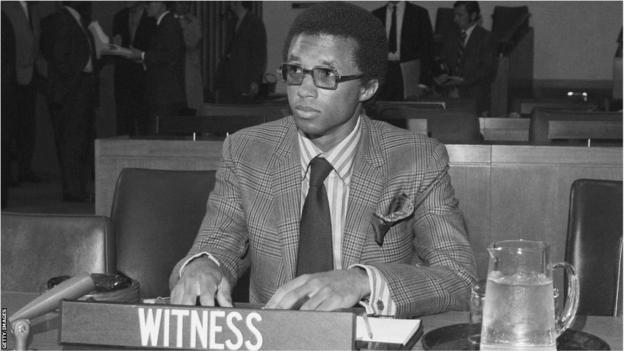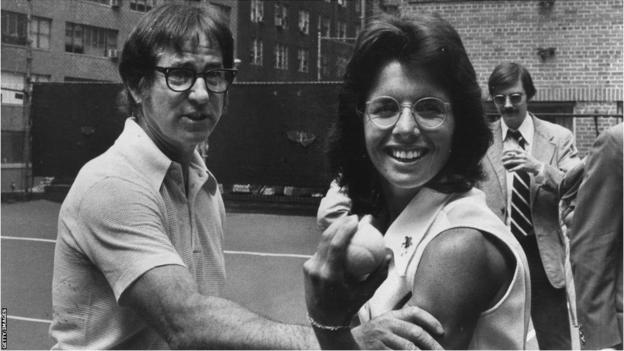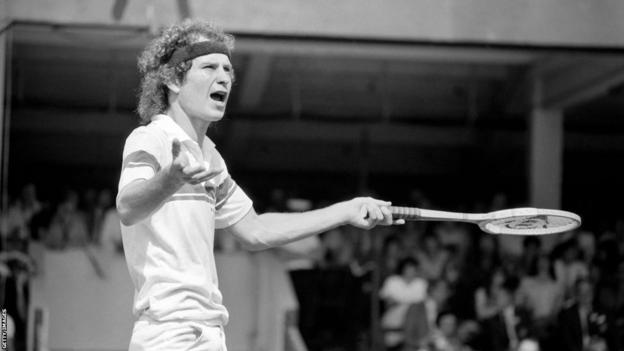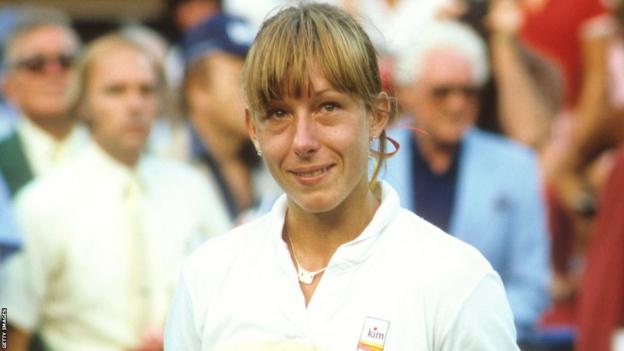| Watch Gods of Tennis on BBC iPlayer. |
A brand new BBC documentary sequence – Gods of Tennis – takes viewers again to the Nineteen Seventies and Nineteen Eighties to discover how a technology of megastars actually put the game on the map.
Over the course of 20 years, gamers resembling Bjorn Borg, John McEnroe, Billie Jean King, Arthur Ashe, Chris Evert and Martina Navratilova grew to become tennis’ first main celebrities.
Tracy Austin, who received the US Open in 1979 aged simply 16, remembers Borg being handled by followers as if he had been one of many Beatles.
Business success adopted, and a few gamers used their elevated profile to assist drive social change.
Austin describes Ashe and King as “unbelievable champions” however provides what they did off the courtroom was “in all probability greater”.
Throughout three hour-long episodes, Gods of Tennis speaks to the gamers who had been there.
Listed here are just some takeaways…
Ashe promoted integration in South Africa

In 1973, Ashe was the primary black skilled to play within the South African Championships. It got here at a time when the nation was nonetheless underneath Apartheid rule.
Ashe, who grew up underneath segregation in Virginia in the USA, made his participation contingent on one stipulation.
“He demanded the event needed to be built-in,” says South African creator Mark Mathabane.
For the primary time in South African historical past, Mathabane provides, black folks had been capable of play and spectate on the event.
Ashe could have been overwhelmed within the remaining by fellow American Jimmy Connors, however to Mathabane he was the true winner.
“He made numberless black folks in South Africa realise Apartheid relies on a lie,” he says.
Already a US Open winner by that stage, Ashe went on to win the Australian Open and Wimbledon.
The ‘Battle of the Sexes’ turned ‘hobbies’ into ‘careers’

When Billie Jean King received the 1972 US Open, her prize cash was $10,000. The lads’s champion – Ilie Nastase – took dwelling $25,000.
The next yr, King shaped the Girls’s Tennis Affiliation (WTA), with a mission to realize equal pay.
Later in 1973 got here an unlikely episode in that marketing campaign – a weird, one-off match referred to as ‘The Battle of The Sexes’ wherein King, 29, took on 55-year-old former males’s world primary (and self-proclaimed male chauvinist) Bobby Riggs.
Austin advised BBC Sport it “wasn’t only a tennis match, it grew to become an occasion around the globe”.
Within the build-up to the televised match, Riggs made it plain he felt girls had been inferior to males. King noticed him off in straight units.
Briton Sue Barker, who would later win the French Open, remembers how essential it felt. She remembers her coach calling to say: “Your interest has simply develop into a profession.”
Later that yr, the US Open launched equal pay for female and male gamers. The Australian Open started providing equal prize cash in 1984, however reversed that call in 1996, then once more in 2001. The French Open and Wimbledon launched parity in 2007.
‘Misunderstood’ McEnroe ‘knew I used to be proper’

The sequence exhibits how Borg grew to become tennis’ first pin-up within the Nineteen Seventies.
In direction of the top of the last decade, although, an ideal foil for the graceful Swede emerged within the type of brash American McEnroe.
The New Yorker grew to become notorious for his on-court outbursts.
“Each time he performed a match at Wimbledon, he was principally going in opposition to the decorum of the occasion,” says Austin.
In 1981, McEnroe yelled the immortal phrases “you can’t be critical!” after umpire Edward James referred to as a ball out. It grew to become a catchphrase.
McEnroe admits within the sequence he felt “misunderstood” on the time.
“I knew I used to be proper,” he says. “However they would not say ‘look, I missed it, sorry’ simply as soon as.”
Borg received 11 Grand Slam singles titles earlier than retiring on the age of 26. McEnroe retired with seven to his title.
Navratilova cried on courtroom as a result of she felt accepted

Chris Evert v Martina Navratilova was an era-defining rivalry for ladies’s tennis.
Navratilova received 9 Wimbledon singles titles and 167 singles titles general on tour – each of that are information.
Regardless of these achievements, she was “all the time trying to find folks to like her and perceive her”, in keeping with rival Evert.
Navratilova was born in Prague however defected to the USA.
She got here out as bisexual in 1981 – months after King was publicly outed – and has since recognized as a lesbian.
The emotion of all of it got here to the fore on the US Open remaining that yr, when the group gave Navratilova a standing ovation as she acquired her runners-up medal.
“I did not cry as a result of I misplaced the match,” says Navratilova. “I cried as a result of I felt accepted. I all the time needed to belong and now I am a citizen and I am homosexual they usually’re nonetheless clapping.”

